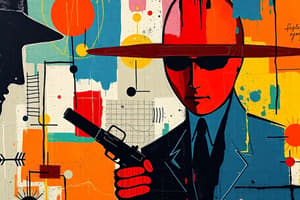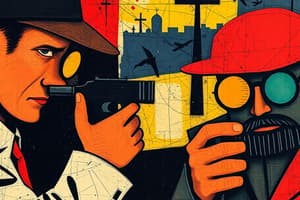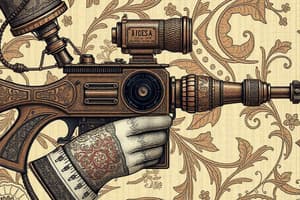Podcast
Questions and Answers
What types of professionals were recruited for the Office of Strategic Services during WWII?
What types of professionals were recruited for the Office of Strategic Services during WWII?
Librarians, professors, and researchers.
Who taught the explosives course at the Special Operations Executive training school?
Who taught the explosives course at the Special Operations Executive training school?
Bill Cumper.
What was the background of Paul Dehn, who taught propaganda?
What was the background of Paul Dehn, who taught propaganda?
He was a reporter and movie critic.
What skill did Ralph Vibert teach students at the training school?
What skill did Ralph Vibert teach students at the training school?
What experience did Peter Folis bring to his teaching at the Special Operations Executive?
What experience did Peter Folis bring to his teaching at the Special Operations Executive?
What unique perspective did Nobby Clark provide to students?
What unique perspective did Nobby Clark provide to students?
What were the instructors at the training school important for besides being spies?
What were the instructors at the training school important for besides being spies?
How did the initial spies differ from the typical portrayal of spies in movies?
How did the initial spies differ from the typical portrayal of spies in movies?
Why is it important for spies to act like normal people?
Why is it important for spies to act like normal people?
What is a reason spies should avoid using obvious passphrases?
What is a reason spies should avoid using obvious passphrases?
What example of a passphrase is suggested to seem less suspicious?
What example of a passphrase is suggested to seem less suspicious?
What should an agent do upon entering the field?
What should an agent do upon entering the field?
How should informants perceive their involvement?
How should informants perceive their involvement?
Why might it be effective to recruit various professionals as informants?
Why might it be effective to recruit various professionals as informants?
What kind of training did spies receive at Beaulieu?
What kind of training did spies receive at Beaulieu?
Who might a bold spy choose as an informant?
Who might a bold spy choose as an informant?
What were students at SOE schools encouraged to read for spy training?
What were students at SOE schools encouraged to read for spy training?
Name one of the SOE-approved spy novels mentioned.
Name one of the SOE-approved spy novels mentioned.
What was a common fate of women SOE agents like Nora Inayat Khan?
What was a common fate of women SOE agents like Nora Inayat Khan?
What were L pills used for by SOE agents?
What were L pills used for by SOE agents?
Why did SOE agents have to choose between carrying a weapon or maintaining their cover?
Why did SOE agents have to choose between carrying a weapon or maintaining their cover?
How were common objects like newspapers and matchboxes utilized by SOE agents?
How were common objects like newspapers and matchboxes utilized by SOE agents?
What did the spy novels convey about the dangers of espionage?
What did the spy novels convey about the dangers of espionage?
Who were Andrée Borrel and Diana Rowden in the context of the SOE?
Who were Andrée Borrel and Diana Rowden in the context of the SOE?
What method did the agent prefer when gathering information from informants?
What method did the agent prefer when gathering information from informants?
Why was it important for agents to know the details about enemy equipment?
Why was it important for agents to know the details about enemy equipment?
What advantages did women have as couriers during the war?
What advantages did women have as couriers during the war?
How could incorrect statements by the agent lead to valuable information?
How could incorrect statements by the agent lead to valuable information?
What was a common threat faced by men in occupied territories?
What was a common threat faced by men in occupied territories?
What example is given of a woman agent successfully transporting equipment?
What example is given of a woman agent successfully transporting equipment?
What type of gossip was encouraged among informants?
What type of gossip was encouraged among informants?
Why were small details about military movements significant?
Why were small details about military movements significant?
Study Notes
Spies and Their True Nature
- Contrary to popular portrayals in films, real spies were often ordinary individuals like librarians and professors during WWII.
- The Office of Strategic Services (OSS), the precursor to the CIA, recruited these individuals for their analytical skills and ability to gather information discreetly.
- Many agents received training from the Special Operations Executive (SOE) in Britain, where instructors varied in expertise, including former agents and specialists in other fields.
Training Schools and Techniques
- SOE training included practical lessons on espionage that addressed real-life situations rather than fictional depictions.
- Key instructors had diverse backgrounds: Bill Cumper, a military engineer, taught explosives; Paul Dehn, a movie critic, taught propaganda; and wilderness survival techniques were taught to help agents avoid detection.
- Agents learned to navigate their environments using disguises and survival skills, often adapting poaching techniques for espionage.
Reality of Espionage
- Fictionalized accounts downplay the dangers faced by spies; many agents experienced brutal fates if captured, particularly women like Nora Inayat Khan and Vera Leigh.
- Death rates were extraordinarily high for SOE female agents; an estimated half of them perished in the line of duty, often facing inhumane treatment.
Operational Guidelines and Tactics
- Agents were trained to blend in with society, acting like regular individuals rather than adhering to cinematic roles.
- Effective communication for spies required less conventional tactics, such as using casual phrases instead of obvious codewords to avoid arousing suspicion.
- A network of informants should be built from seemingly innocuous members of society to gather intelligence effectively.
Informant Management
- Agents were advised to create an appearance of benign curiosity in conversations to elicit information rather than direct questioning.
- Incorporating incorrect statements into discussions allowed spies to obtain corrections which could provide valuable intelligence.
Role of Women in Espionage
- Women excelled as couriers for the OSS and SOE due to societal perceptions and limitations on men, allowing them to operate without attracting undue attention.
- Women could transport sensitive equipment disguised as routine shopping items, making it easier to smuggle vital supplies and intelligence.
Conclusion
- The training and experiences of spies during WWII differ significantly from romanticized versions in popular culture, emphasizing the need for practicality, adaptability, and resilience in the field.
Studying That Suits You
Use AI to generate personalized quizzes and flashcards to suit your learning preferences.
Related Documents
Description
This quiz examines the true nature of espionage during World War II, focusing on the surprising backgrounds of spies compared to their Hollywood portrayals. Join Elyse Graham as she uncovers the mundane yet dangerous realities of spy work and the origins of agencies like the OSS.




